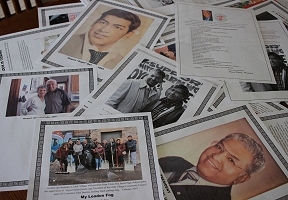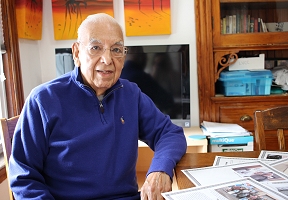

By: Ashmar Mandou
Activist Cesar Chavez once said, “we cannot seek achievement for ourselves and forget about progress and prosperity for our community…our ambitions must be broad enough to include the aspirations and needs of others, for their sakes and for our own.” Chavez dedicated his life to improving the working conditions of labor workers across the United States, inspiring many to create changes within their own communities, including one of Chicago’s unsung heroes August “Augie” Sallas, who spent over 30 years of his life developing programs for the underrepresented residents of Little Village. “I had the privilege of meeting Cesar Chavez. Chavez truly was an inspiration who galvanized a community to work together to bring about better treatment of Latino workers,” said Sallas, in his raspy voice. “His dedication and passion for his community inspired me, motivated me to do something for the place I call home.”
Born in 1935 on the South Side of Chicago to Mexican immigrants, Sallas spent the majority of his formative years at the North Side of Chicago Angel Guardian Orphanage (AGO), alongside his older brother, when both parents passed away of tuberculosis. At the age of 13, Sallas and his brother were adopted by their uncle, Eddie Maydon. “I learned a lot living in that orphanage,” said Sallas. “I learned about how children deal with grief, I learned about human nature, I learned the importance of building a sense of community.” Having endured hardships early in life, Sallas focused on his education growing within the ranks of the Chicago Typographical Union No. 16, eventually serving as president of the organization where he mediated and ended the printer’s three-year strike with the Chicago Tribune.
After his career as a printer, Sallas became a public servant working under the administration of Mayor Richard M. Daley for over fourteen years, serving as manager of customer services in the Information Booth. “While I worked at City Hall, I had the opportunity to build relationships with all the aldermen, with our former Mayor…I had the opportunity to create a program that brought high school students from all over the city to City Hall to introduce them to the inner workings of the building. I enjoyed every minute of it.” In addition to his time at City Hall, Sallas served as president of the Hispanic American Labor Council and served as a member of the Hispanic Advisory Council for former State’s Attorney Anita Alvarez, and even threw his hat into the arena of politics, running for alderman of Little Village.
Although his vision of representing Little Village in an official way didn’t come to fruition, Sallas shared his greatest achievement was in his role as president of the Little Village Community Council. “While working at City Hall I learned of all the programs elected officials were able to develop, I learned how they were organized, and who to speak to…I brought everything I learned to Little Village,” said Sallas. “Through the community council, we were able to bring free legal counseling, free expungement workshops, we developed a senior club, hosted free health seminars, conducted college and job fairs, and hosted back-to-school fairs. You name it, we hosted it [laughed]. Nothing gave me greater joy than to see the lives of residents from Little Village change for the better.” Nowadays, Sallas has no intention of slowing down as he is in the process of writing an autobiography. “I just hope people can become inspired through my stories, inspired enough to make a difference.”











